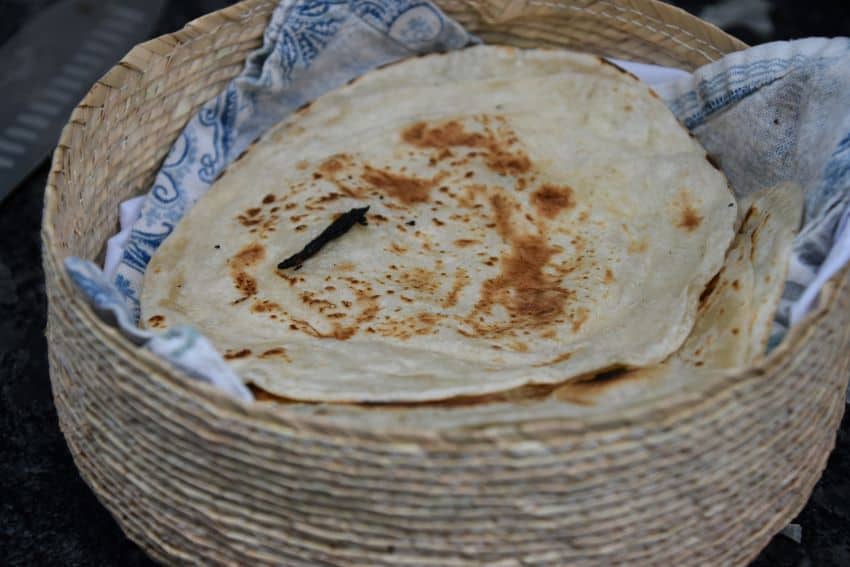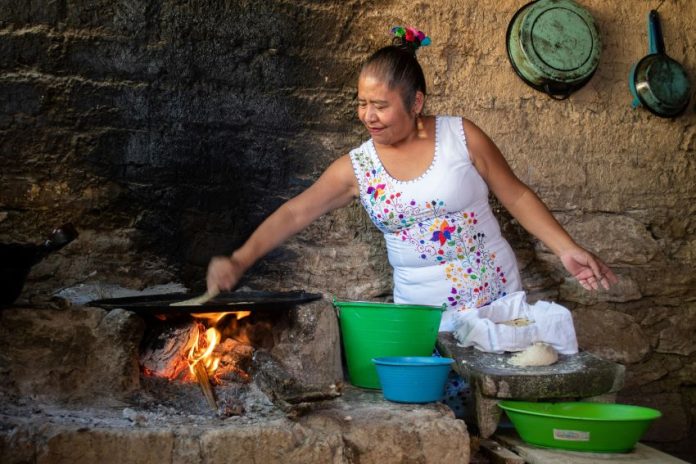Have you wondered where and when Mexicans think it is appropriate to eat tortillas?
The answer is everywhere and all the time.

In the ancient lands of Mesoamerica, the Aztecs and Maya were pioneers in cultivating corn. Aztec legend tells a mesmerizing tale of the “Children of Corn,” where the goddess Tonantzin crafted the first humans from the essence of this golden grain. This myth weaves a cosmic connection between Mexicans and their sacred crop, making corn not just a harvest, but also a profound part of their identity.
Even today, corn remains a fundamental element in the diets and cultural identity of people in Mexico and Central America, portrayed as a sacred and life-giving force.
How is corn turned into tortillas?
Nixtamalization, a Mesoamerican technique still used to this day, involves soaking dried corn in an alkaline solution, typically made from slaked lime. This process is crucial in creating masa, the dough, and improves the corn’s nutritional value by enhancing the bioavailability of nutrients, as well as contributing to its distinctive taste. After soaking, the corn is rinsed, cooked until plump, washed to remove excess alkaline solution, ground into masa, and finally shaped into thin discs, ready to be cooked and savored as delicious tortillas.
Corn tortillas are a nutritious choice for a healthy diet. They’re low in fat and packed with complex carbohydrates that provide a steady source of energy throughout the day. Their fiber content contributes to digestion and a feeling of fullness. Corn tortillas are also gluten-free and bring essential nutrients to the table, including calcium, iron, magnesium, and B vitamins.
Tortillas are a matter of national policy
In 2020, President Andrés Manuel López Obrador published a decree that effectively prohibits the use of genetically modified corn for human consumption. The decree also specifically demands that tortilla producers only use corn grown in Mexico. Citing the protection of native corn varieties and public health concerns related to agrochemicals, the decision is framed as a move to safeguard local agriculture and health. This has triggered international tensions due to its potential impact on grain exports from the United States to Mexico.
Tortillas are such a staple food in Mexico, that ensuring affordable tortilla prices has been a longstanding priority for the government. This commitment to affordability is rooted in the government’s aim to guarantee food security and meet the nutritional requirements of the people. Even inflation rates are closely linked to tortilla prices, so essential is the food to everyday life in Mexico.
How do Mexicans eat tortillas?
Tortillas are placed at the table in baskets, called tortilleros, which are often the most cherished item in the kitchen. Every neighborhood has at least one tortillería, where people line up at lunchtime to buy by the kilo.
View this post on Instagram
What can you make with tortillas?
Mexicans eat tortillas in every possible way. Roll some savory meat or stew into a tortilla, fold it snug, and bam, it’s taco time. Fold a tortilla with cheese, toss it on the grill, and voila, you’ve got a quesadilla. Dip the tortilla in salsa before filling and rolling, and there you have it, an enchilada. Grab some stale tortillas, chop them into bite-sized bits, fry to perfection, smother them in salsa, sprinkle cheese on top and dive into a bowl of tasty chilaquiles!
For cold weather, drop a handful of fried tortilla strips into warm flavorful broth, add avocado and cheese cubes and you have sopa de tortilla. Challenge the sturdiness of a flat crispy tortilla by piling on lots of toppings to enjoy a tostada. In an homage to lasagna, place layers of tortillas, shredded chicken, cheese and salsa in a baking dish and meet pastel azteca.
In Mexican households, the art of making tortillas isn’t just about sustenance; it’s a cherished tradition that unites families around the kitchen table. Often a collaborative effort, particularly among women, the process of pressing masa into perfectly round discs is a ritual that strengthens bonds. And when men return home from their day’s work, the sight of freshly handmade tortillas is a rewarding show of love.
A simple, unassuming tortilla can become a masterpiece, weaving stories of the divine origin, natural resilience and life-giving nutrition that are the sustenance of a nation’s soul. Among the culinary wonders of the world, the tortilla stands tall.
Sandra is a Mexican writer and translator based in San Miguel de Allende who specializes in mental health and humanitarian aid. She believes in the power of language to foster compassion and understanding across cultures. She can be reached at: [email protected]
